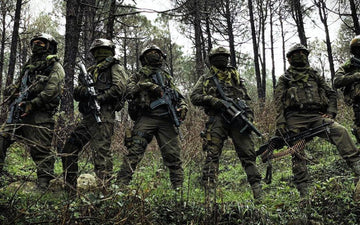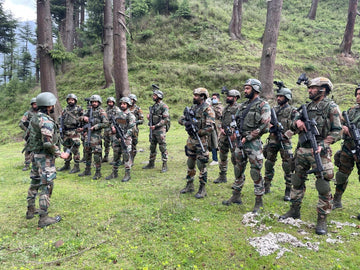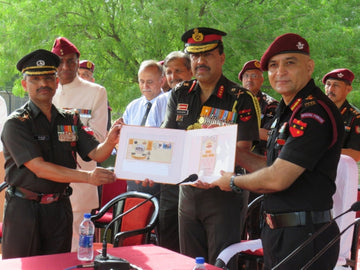Articles
How to Become a Doctor in Indian Army?
by Olive Squad
on
Jun 20, 2025
Becoming a doctor in the Indian Army is a prestigious aspiration for many medical students across the country. The integration of healthcare with military service offers a unique opportunity to not only practice medicine but to serve the nation as well. With a rich history of medical services within the Armed Forces and a structured pathway to enter this noble profession, prospective candidates should be well-informed about the journey ahead. This article delves into the various pathways, requirements, and selection processes involved in becoming a doctor in the Indian Army, providing a comprehensive guide to aspiring medical professionals.
Historical Context
The Indian Army has long recognized the importance of medical services in ensuring the health and well-being of its personnel. The establishment of the Army Medical Corps (AMC) in 1943 marked a significant development in military healthcare, aligning medical education and healthcare delivery with the rigors of military life. Over the years, the system has evolved to recruit highly qualified medical professionals who not only treat injuries and illnesses but also contribute to research, field operations, and disaster relief. The significance of this role cannot be understated; the medical officers are central to maintaining the army’s operational capabilities.
Educational Qualifications
To launch a career as a doctor in the Indian Army, one must fulfill specific educational qualifications, primarily obtained through two avenues: the Armed Forces Medical College (AFMC) and the Army Medical Corps (AMC).
Through the Armed Forces Medical College (AFMC)
The Armed Forces Medical College, located in Pune, is one of the premier medical institutions in India. Here’s a step-by-step guide to the process:
-
Clearing NEET: Candidates aspiring to join AFMC must first clear the National Eligibility cum Entrance Test (NEET). This examination serves as a benchmark for assessing knowledge in subjects crucial to medical education.
-
SSB Interview: After successfully navigating through NEET, candidates are invited for the Service Selection Board (SSB) interview. This comprehensive evaluation assesses various attributes like psychological fitness, team orientation, leadership potential, and overall personality, ensuring that candidates possess qualities befitting a military doctor.
-
Medical Examination: Following the SSB, candidates undergo a thorough medical examination to evaluate their fitness for military service, which includes strict physical and mental health criteria.
-
MBBS Program: Those who successfully pass through all stages enter an intensive 5.5-year MBBS program. This includes both academic coursework and practical training, instilling a comprehensive understanding of medical practices.
-
Commissioning: Graduates are granted a permanent commission in the Indian Army, allowing them to advance their careers with responsibilities that come along with military service.
Through the Army Medical Corps (AMC)
For those who have already completed their medical education, the pathway shifts slightly:
-
Medical Degree Requirements: Candidates need to possess an MBBS or BDS degree from a recognized institution. For those holding postgraduate degrees like MD or MS, opportunities expand for advanced roles within the AMC.
-
Interview and Medical Exam: Candidates must pass an interview to assess their competencies and undergo a medical examination similar to those pursuing the AFMC route.
-
Service Commitment: Successful candidates will likely enter into either a Short Service Commission or a Permanent Commission based on qualifications and the selection process.
Selection Process
Understanding the selection process for both AFMC and AMC is crucial for candidates. Let's explore the specifics beginning with AFMC.
For AFMC
-
National Eligibility cum Entrance Test (NEET): The first and foremost step is clearing the NEET, which serves as the primary admission criterion for the AFMC.
-
SSB and Medical Evaluation: Candidates participate in the SSB interview and comprehensive medical assessments, which focus on the physical standards required for military service.
-
Final Selection: Only those who excel in NEET, SSB, and medical evaluations are admitted to AFMC.
For AMC
-
Degree Verification: Candidates must demonstrate their medical qualifications through relevant documentation, including degrees and certificates.
-
Interview Process: Candidates undergo an assessment interview panel comprising senior officers who evaluate their suitability for military service.
-
Medical Examination: Medical assessments follow, continuing the strict standards upheld within the army.
Types of Commission
Once you secure a position in the Indian Army as a medical professional, understanding your commission type is crucial.
Short Service Commission (SSC)
- The Short Service Commission generally involves a commitment of ten years, with the potential for an extension of up to four years. This route allows for flexibility and the possibility of transitioning to a Permanent Commission based on performance metrics and service requirements.
Permanent Commission
- Available primarily to those who complete the MBBS degree through AFMC, the Permanent Commission offers graduates a lifetime commitment to service. This pathway leads to higher responsibilities and ranks within the Army Medical Corps.
Recruitment Process for 2025
For aspiring medical officers eyeing a career in military medicine, the recruitment process for 2025 presents promising opportunities:
-
Application Dates: The online application for the Armed Forces Medical Services (AFMS) Medical Officer recruitment commenced on 19 April 2025 and concluded on 12 May 2025.
-
Interview Schedule: The interview phase is scheduled for 19 June 2025, wherein shortlisted candidates from the application phase will be evaluated further.
-
Number of Vacancies: A total of 400 vacancies are available for Medical Officers in the AFMS recruitment drive, signifying robust opportunities in the healthcare sector of the Indian Army.
-
Salary: The compensation for Medical Officers is approximately Rs. 85,000 per month, making it an attractive career option.
Additional Requirements
Beyond mere qualifications and processes, several additional requirements must be fulfilled:
Medical Standards
Candidates must meet high medical and physical standards. The screening includes tests for:
- Vision standards
- Hearing
- General physical fitness
- Psychological assessment
These evaluations ensure that candidates are prepared for the demanding nature of service in the military.
Application Fees
- Interested candidates are required to pay an application fee through the AFMS website using net banking or credit/debit cards. This must be completed by 12 May 2025 at 23:59 hrs to ensure eligibility for application consideration.
Challenges in Pursuing a Medical Career in the Army
While the prospect of becoming a military doctor is rewarding, there are challenges one must acknowledge:
-
Rigorous Training: The transition from civilian medical education to military service requires adaptability to the rigors of army training.
-
Deployment Stress: Medical officers may face high-stress environments, including deployments to conflict zones or disaster-stricken areas.
-
Work-Life Balance: Handling the commitments associated with military service while providing quality healthcare can be daunting.
Solutions to Overcome Challenges
Preparing to overcome these challenges is essential:
-
Mental Preparedness: Engaging in psychological preparation and resilience training can help candidates acclimatize to stressors prevalent in military service.
-
Support Systems: Building robust support structures, both professionally and personally, can alleviate stresses associated with the job.
-
Continuous Learning: Engaging in continuous medical education and training can bolster confidence and competency, ensuring that military doctors remain effective in diverse situations.
Future Trends and Predictions
The medical field within the Indian Army is poised for evolution as healthcare technology and practices advance:
-
Telemedicine: The integration of telemedicine could transform healthcare delivery in remote areas or during emergencies, maximizing the reach and efficiency of medical care.
-
Advanced Research: Investment in medical research specific to military contexts, including trauma care and battlefield medicine, could enhance treatment protocols for service members.
-
Focus on Mental Health: Given the stresses associated with military service, there’s an increasing emphasis on mental health services, ensuring holistic care for service personnel.
Conclusion
Becoming a doctor in the Indian Army is a multifaceted journey that demands dedication, resilience, and a strong commitment to service. Through well-defined pathways, aspiring candidates can align their medical aspirations with the responsibilities of military service, ensuring not only personal growth but also significant contributions to national health and well-being. The journey from aspiring medical student to military doctor is both challenging and rewarding, and with the right information and preparation, individuals can set themselves on a successful path. The Indian Army's commitment to healthcare excellence makes it an attractive choice for those passionate about medicine and service. If you are ready to embark on this journey, it is time to prepare, apply, and serve your country with pride.





